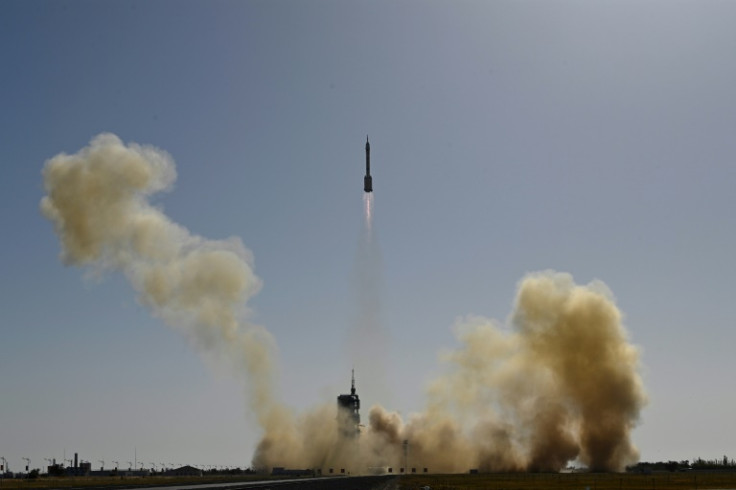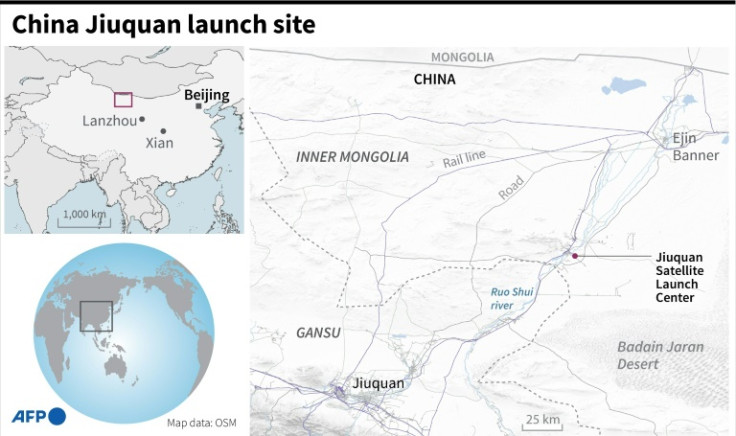China Launches New Mission To Space Station

China sent a fresh crew to its Tiangong space station on Thursday, in the latest mission for a growing space programme that plans to send people to the Moon by 2030.
The Shenzhou-17 blasted off from the Jiuquan launch site in northwest China at 11:14 am (0314 GMT), carrying a three-astronaut team with the youngest average age since the space station's construction.
At a farewell ceremony, hundreds of supporters waving the Chinese national flag and clutching yellow flowers cheered on the three astronauts -- wearing white and blue spacesuits -- as they were introduced to the crowds.
The patriotic song "Ode to the Motherland" was sung as the space travellers walked slowly down a short pathway between the crowds, smiling and waving goodbye before boarding a bus to the launch site.
Captaining the crew is Tang Hongbo, who is on his first return mission to the space station.
Accompanying him are Tang Shengjie and Jiang Xinlin, both in their thirties and each making maiden space voyages.
The all-male crew is the youngest ever to man a mission to the space station, with an average age of 38.
They are set to "perform various in-orbit space science and application payload tests and experiments", Lin Xiqiang, deputy director of the China Manned Space Agency, said on Wednesday.
They will also conduct some maintenance work on the station to fix some "minor damages" from space debris, he said.
"We have found that the solar wings of the space station had been hit by tiny space particles several times," Lin explained.
Members of the previous Shenzhou-16 crew -- aboard Tiangong for nearly five months now -- are preparing to receive the trio before returning to Earth next week.
Hundreds of spectators gathered on Thursday morning near the rocket site at the Jiuquan Satellite Launch Centre, in the Gobi Desert, some wearing the blue uniforms of China's space agency.
Excitement broke out among the crowd as a loudspeaker blared a countdown and the rocket lifted off, sending plumes of smoke across the launch pad and the dry, flat desert expanse surrounding the site, before the increasingly loud roar of the engines drowned out the applause.
A livestream showed the crew onboard the space station monitoring their ascent in anticipation of their arrival.
After the rocket had been airborne for about 15 minutes, a space programme official proclaimed the launch a "complete success".
Tiangong, the crown jewel of Beijing's space programme, is constantly crewed by rotating teams of three astronauts.
Plans for China's "space dream" have been put into overdrive under President Xi Jinping.
The world's second-largest economy has pumped billions of dollars into its military-run space programme in an effort to catch up with the United States and Russia.
In June, the return capsule of the Shenzhou-15 spaceship touched down at a landing site in the northern Inner Mongolia region, with state media hailing the mission as a "complete success".
That month also saw the launch of the Shenzhou-16 capsule, which carried the first Chinese civilian -- Beihang University professor Gui Haichao -- into orbit.
Beijing also aims to send a crewed mission to the Moon by 2030 and plans to build a base on the lunar surface.
Deputy director Lin reiterated that aim Wednesday, saying that the "goal of landing Chinese people on the moon by 2030 will be realised as scheduled".


© Copyright AFP 2024. All rights reserved.











